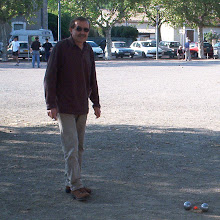Illness rather than lack of enthusiasm or time caused the abrupt halt just as this was beginning to take shape on the page - even in the country with the world's finest cuisine, it is still quite possible to buy a suspect tuna and mayo sandwich! However, part of the attraction of this very format is that one can come and go, prod the subject around, and generally approach things as informally as one wants. Perhaps some structure will emerge - and already I have wondered if there might be some value in developing some sort of expat mutual support theme - but there is no rush.
Around and about the dubious sandwich incident, there have been a couple of encounters coincidentally relevant to this early stage. Peak summer is the time for outdoor parties and events in the South of France and one not to be missed is our "fête du quartier" (a fête for just our area of the village), a day of dining, playing pétanque, eating again, and then partying into the night - attended by about 120 people. A British couple visiting their holiday home explained that both had experienced childhoods in various countries with parents always living and working overseas. They said that, like their parents, wherever they might live in the world they would always maintain a base in the UK, as their ultimate home. They also added that they are the new British couple living in the village.
So much to consider in the context of the expatriate! First of all we have the element of being a temporary expat, when posted temporarily overseas for work - one will always be returning. Then the idea of choosing to live elsewhere, for any duration, but always maintaining a base "back home". Well, our definition of "a person living in a foreign country" does not put on any time constraint or require roots to be severed.
If one looks at how far an expat can commit to, and integrate into, the host society, perhaps a fixed time limit, such as a contract or posting, does create a quite understandable barrier - it might partly explain the creation of expat communities, maintaining a degree of separation from the local people. Similarly, it would be understandable if the permanent safety net of a home base would naturally hold back one's commitment within another society. However, albeit that our definition requires no specific time limit, can one be said to be an expat when the situation is visiting one's holiday home?
I will have to come back to the whole area of time-limited expats, commitment and, in particular, expat communities!
For the second encounter... at a dinner celebrating the renovation of a public building and attended by several hundred local people, neighbours at table recounted how their working life in government service has seen them posted to a few regions within France as well as various overseas French dominions and rarely staying in one place for more than a couple of years. Again, living overseas with time limits, but now we have postings from France to French overseas territories!
Given probable cultural differences in overseas territories of the same country, this scenario perhaps supports the case for the expat definition to be stretched to include "those who live away from their origins" (refer to the last post). Looking at the etymology, the original words being ex patria - outside of one's native land - then it seems quite justifiable to include those relocating to overseas territories or even to distant parts of their own country.
In any event, this broader definition perhaps will help us see how people behave, and how they are reacted to, when they are living somewhere else...











